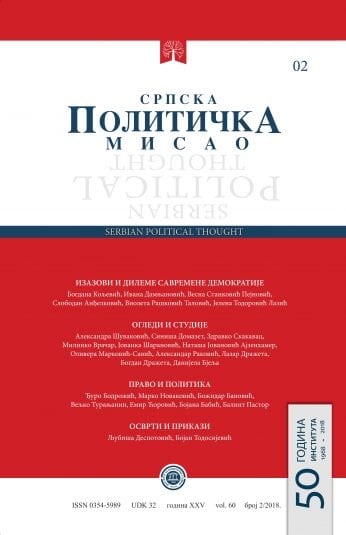Бели шум на друштвеним мрежама: улога друштвеног капитала у изборним кампањama
White Noise in Social Media: The Role of Social Capital in Election Campaigns
Author(s): Zoran ĆirjakovićSubject(s): Media studies, Electoral systems, Politics and communication, Theory of Communication
Published by: Институт за политичке студије
Keywords: election campaigning; social media; social capital; auto-orientalism; internet pessimism; Serbia
Summary/Abstract: The author analyzes some of the reasons why social media did not significantly influence the results of the Serbian presidential elections held in April 2017 and why the influence was largely negative. The internal political and foreign policy factors are noted that contributed to the predictable outcome of the elections and frustrated anti-regime activism. Putting an emphasis on the activities of supporters of the opposition candidates on Twitter, the author presents their discourse and highlights the reasons for it leading to destructive polarization and, in essence, making the task of the candidate of the ruling coalition easier. Even when it comes to the most wired segment of the urban population, the abundance of insults and ugly words, often aimed not at the candidate of the ruling coalition but at regime’s supporters and other opposition candidates, was an important feature of the engagement that was more focused on raising social capital and reinforcing autoorientalist markers of distinction rather than on meaningful struggle for change. A set of factors is highlighted that contributed to the increasingly important social media social capital acting as an obstacle to democratization, effective political engagement and the badly needed change of political culture. In the specific nature and dynamics of the political scene shaped over the past decades and the anti-social flip-side of social media, the author finds the reasons for pessimism when it comes to the possibility of social media getting a more constructive role in the election campaigning in Serbia. The paper focuses on Twitter, the elite-tilted social network of choice in electoral campaigns worldwide, to examine the role of a set of key factors that both frustrated and contributed to negative effects of social media campaigning of the anti-regime activists. First, combination of strong distinction-reinforcing and auto-orientalist drives further marginalized and self-ghettoized oppositional activism, simultaneously provoking the strong anti-elitist and populist backlash, which favored the ruling coalition’s candidate. Second, the regime skillfully cornered both pro-Western and pro-Russian alliances and sentiments, leaving almost no space for meaningful campaigning to unimaginative opposition candidates, who saw Serbia’s future in autocolonial terms, as outsourcing of the state’s sovereignty in exchange for material and political benefits from either Russia or one of the Western metropolitan states. In given circumstances, opposition activists’ campaigning on social networks degenerated into a combination of sullied intra-oppositional “civil war“ and anti-political diary of insults, directed more at the regime impoverished supporters than at the regime’s candidate himself. What the resilient, authoritarian but not repressive regime might have felt as little more than a mildly irritating “white noise”, general public largely experienced as a narcissistic and vulgar enterprise detached from their concerns and aspirations.
Journal: Српска политичка мисао
- Issue Year: 2018
- Issue No: 4
- Page Range: 169-192
- Page Count: 24
- Language: Serbian

